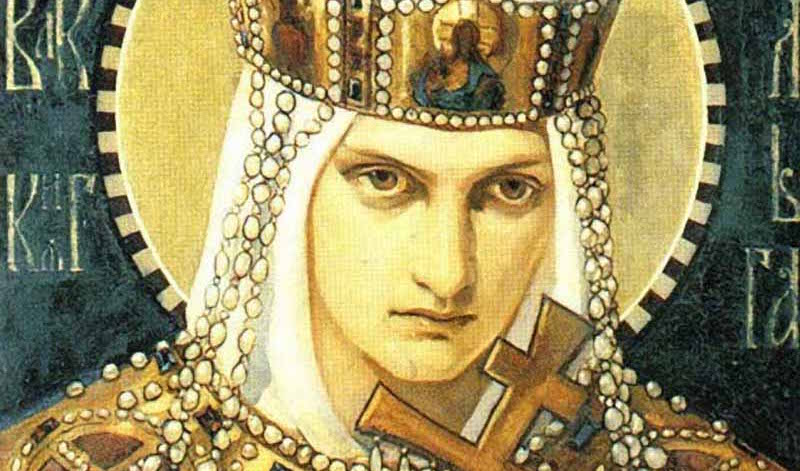Once a month here on the Molten Sulfur Blog, I run content taken from our book Archive: Historical People, Places, and Events for RPGs. This post, about Olga of Kiev, is one of eighty entries in Archive, each more gameable than the last!

Olga of Kiev
Vengeful Saint
The story of Princess Olga of Kiev is one of religion and revenge. Many of the facts about her life are still in dispute, but it’s known she helped bring Christianity to Russia and carved a bloody swath across eastern Europe. The most traditional theory claims Olga was born at the turn of the 10th century in Russia to a family of Viking immigrants. She married Igor of Kiev, tsar of a Viking-run, proto-Russian state called the Kievan Rus. Princess Olga was thrust into the spotlight when her husband Igor was killed by a Slavic tribe called the Drevlians. Tsar Igor was visiting the Drevlians to collect tribute from them, and the Drevlians apparently felt rather strongly that Igor was demanding too much.
Igor’s son was only three years old, and Olga had the support of the Rus army, so she took power. The Drevlians had sent matchmakers to Olga, proposing that she marry their prince. Olga disagreed, and instead carried out four acts of vengeance against the Drevlians. First, she captured the twenty matchmakers and had them buried alive. She asked the Drevlians to send better ambassadors, but when they arrived, they were burned in a bathhouse. Soon after, she traveled to the land of Drevlians, supposedly to have a funeral feast in memory of Igor. She invited some of her enemies, got them all drunk, and then ordered them killed. The Old Russian annals report about five thousand dead from this third act. The last act happened later, when Olga was traveling through Drevlian lands gathering tributes, and one town refused to pay. According to one legend, she asked each household to present her with a dove as a gift instead. She took the doves, tied burning papers to their legs, and let them fly back to their homes. The town burned to the ground.
When Olga’s son came of age, she stepped down. Even so, the new tsar spent most of his time abroad and left internal policy to his mother. Olga established a system of gathering tribute that some consider to be the first legal tax system in Eastern Europe. She is also thought to have initiated the first stone city building in the Kievan Rus.
Today, Olga is best-known for helping Christianize the Kievan Rus. She was baptized in Constantinople, and attempted to build connections with the Byzantine and Holy Roman emperors, two of the highest authorities of the Christian church at the time. Records conflict about the sincerity of her actions. Some say she was hesitant about which emperor to reach out to, or that she conducted a forward-looking policy of pressuring Constantinople. Olga’s son did not appreciate her new faith. He feared her conversion would lose him the respect of the army. Still, when Olga died, he ordered her buried according to Christian tradition. When Olga’s grandson became ruler, he declared Christianity the official religion of the Kievan Rus. In 1547, the Orthodox Church proclaimed Princess Olga a saint, and one of only five women to carry the title ‘Equal to the Apostles’.
Olga of Kiev in Play
At your table, an NPC based on Olga would be a terrific queen or warlord. If the PCs are working for her, they might watch her kill the first twenty matchmakers. Imagine their trepidation when she sends them on a diplomatic mission to demand twenty more. The PCs would have to try to smooth over the incident, promise better treatment the second time around, and hope to be safely back in Olga’s lands before the next band of matchmakers die screaming. Later in life, Olga might send the party to teach a lesson in manners to a group interfering with her tribute reforms. If you want to establish Olga as a villain, have the PCs witness the incident with the doves – in their own home village! Or, if you want to use Olga as a foreign queen, she might be sending religious overtures to the party’s king. If he charges the PCs with learning more about her, they’ll have to decide how to frame their discoveries. Was her vengeance justified? Is her religious conversion sincere? Is it worth it for the PCs’ king to embroil himself in Olga’s often bloody business?






